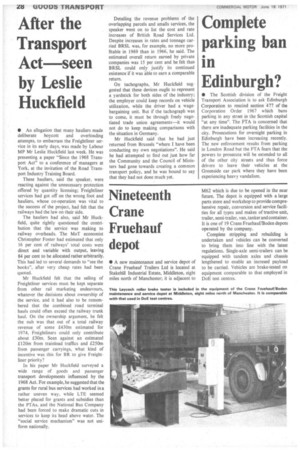After the Transport Act seen by Leslie Huckfield
Page 30

If you've noticed an error in this article please click here to report it so we can fix it.
• An allegation that many hauliers made deliberate boycott and overloading attempts, to embarrass the Freightliner service in its early days, was made by Labour MP Mr Leslie Huckfield last week. He was presenting a paper "Since the 1968 Transport Act" to a conference of managers at York, at the invitation of the Road Transport Industry Training Board.
These hauliers, said the speaker, were reacting against the unnecessary protection offered by quantity licensing; Freightliner services had got off on the wrong foot and hauliers, whose co-operation was vital to the success of the project, had felt that the railways had the law on their side.
The hauliers had also, said Mr Huckfield, quite rightly questioned the contribution that the service was making to railway overheads. The MoT economist Christopher Foster had estimated that only 16 per cent of railways' total costs were direct and variable with output, leaving 84 per cent to be allocated rather arbitrarily. This had led to several demands to "see the books", after very cheap rates had been quoted.
Mr Huckfield felt that the selling of Freightliner services must be kept separate from other rail marketing endeavours, whatever the decisions about ownership of the service, and it had also to be remembered that the combined road terminal hauls could often exceed the railway trunk haul. On the ownership argument, he felt the nub was that out of a total railway revenue of some £430m estimated for 1974, Freightliners could only contribute about £30m. Seen against an estimated £120m from trainload traffics and £250m from passenger carryings, what kind of incentive was this for BR to give Freightliner priority?
In his paper Mr Huckfield surveyed a wide range of goods and passenger transport developments influenced by the 1968 Act. For example, he suggested that the grants for rural bus services had worked in a rather uneven way, while LTE seemed better placed for grants and subsidies than the PTAs, and the National Bus Company had been forced to make dramatic cuts in services to keep its head above water. The "social service mechanism" was not uniform nationally.
Detailing the revenue problems of the overlapping parcels and smalls services, the speaker went on to list the cost and rate increases of British Road Services Ltd. Despite increases in rates and tonnage carried BRSL was, for example, no more profitable in 1969 than in 1966, he said. The estimated overall return earned by private companies was 15 per cent and he felt that. BRSL could only justify its continued existence if it was able to earn a comparable return.
On tachographs, Mr Huckfield suggested that these devices ought to represent a yardstick for both sides of the industry; the employer could keep records on vehicle utilization, while the driver had a wagebargaining unit. But if the tachograph was to come, it must be through freely negotiated trade union agreements—it would not do to keep making comparisons with the situation in Germany.
Mr Huckfield said that he had just returned from Brussels "where I have been conducting my own negotiations". He said he had attempted to find out just how far the Community and the Council of Ministers had gone towards creating a common transport policy, and he was bound to say that they had not done much yet.
































































































































